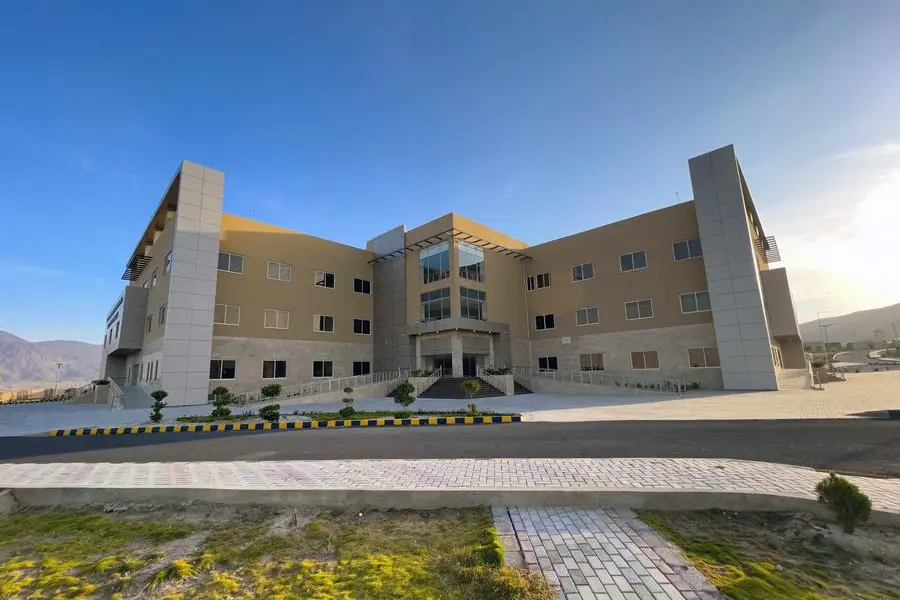PHOTO
QUETTA, Pakistan - Pakistan's Army Chief of Staff General Qamar Javed Bajwa on Thursday opened the Sheikh Mohamed bin Zayed Al Nahyan Institute of Cardiology, which was implemented in the city of Quetta, the capital of Balochistan province.
The building is constructed on an area of 121,406 square metres, and at a cost of $27.30 million funded by the Abu Dhabi Fund for Development.
The move follows the directives of President His Highness Sheikh Mohamed bin Zayed Al Nahyan and with the support and follow-up of H.H. Sheikh Mansour bin Zayed Al Nahyan, Deputy Prime Minister and Minister of the Presidential Court.
The project is implemented within the framework of the continuous support of the leadership of the UAE to the Islamic Republic of Pakistan for the implementation of humanitarian and development projects.
The opening ceremony was attended by Mir Jan Jamali, Governor of Balochistan; Hamad Obaid Al Zaabi, UAE Ambassador to Pakistan; Abdullah Khalifa Al Ghafli, Director of the UAE Pakistan Assistance Programme (UAE PAP); doctors; paramedical staff and senior civil and military officials.
The opening ceremony began with a briefing on the project’s stages and a presentation of the Emirati humanitarian development projects that were implemented in the Balochistan region during the past three years through the UAE Pakistan Assistance Programme.
Then, Lieutenant General Qamar Javed Bajwa, accompanied by Ambassador Al Zaabi and Abdullah Al Ghafli, unveiled the commemorative plaque to mark the official opening of the Mohamed bin Zayed Institute of Cardiology, praying to the Almighty Allah to grant Sheikh Mohamed bin Zayed good health, blessing, success, wellness and longevity, and wishing the UAE further progress, wellbeing, prosperity, security and stability.
Later, the guests toured the wards of the institute, which is equipped with the latest machinery and a state-of-the-art cardiology facility.
Speaking on the occasion, UAE PAP Director highlighted the significance of the initiatives of His Highness Sheikh Mohamed bin Zayed Al Nahyan and the generous support and follow-up of Sheikh Mansour bin Zayed Al Nahyan.
He added that such initiatives contribute to the comprehensive development of the individual and society, support and strengthen the capabilities of the health sector in Pakistan, and enable it to exercise its effective role in providing the best healthcare services to its citizens.
Through these initiatives, multiple health projects were implemented and completed, represented by the establishment, equipment and maintenance of a number of hospitals, clinics, health centres and nursing institutes in various Pakistani regions, he noted.
The institute will serve as a reference centre for hospitals and clinics in the region concerning the diagnosis and treatment of diseases, heart and cancer diagnosis for all residents of the regions and cities of Balochistan and neighbouring provinces, which qualifies it to provide distinguished specialised treatment services by medical and technical cadres with expertise and scientific competence.
The institute will benefit 12 million Pakistani in the Balochistan province. The number of heart patients is about 70,900, of whom more than 1,064 die annually due to the lack of treatment.
The institute's absorptive capacity includes providing diagnostic and treatment services to over 500 patients daily and 182,000 patients annually, with a medical staff of 136 doctors and specialists, in addition to 350 nurses and technicians.
The institute consists of 17 buildings. The main building includes outpatient departments, specialised clinics, an emergency department, a dental department, a cardiac catheterisation room, intensive care units, and inpatient suites with a capacity of 120 beds. Also, a dialysis department with a capacity of 18 beds, a pharmacy and eight specialised laboratories for medical examinations (nuclear radiation, biochemistry, hematology, immunology, bacteria, molecular biology production, and two others for cardiac catheterisation).
The institute also includes a biomedical department to conduct clinical research and scientific studies on cases of cardiovascular disease using modern technologies.
It also contains independent administrative and service buildings that include housing for doctors, nurses, and administrators, in addition to a mosque, a building for the administration of the institute, a club for doctors and employees, an energy management station, centres for collecting medical and hazardous waste, a helipad for ambulance planes, a fire station, control towers, gardens, a market, and parking lots.
During the opening ceremony, Pakistan's Army Chief of Staff conferred the UAE PAP Director the Hilal-i-Pakistan or Crescent of Pakistan, which was awarded to him by Pakistani President Arif Alvi in recognition of his efforts in managing and implementing humanitarian and development projects in Pakistan.
The patients expressed their deep thanks and appreciation to President His Highness Sheikh Mohamed for gifting them this prestigious specialised medical centre.
For their part, the consultants, doctors, nurses, and technical and administrative staff at the institute offered their sincere appreciation and gratitude to His Highness Sheikh Mohamed for completing this tremendous humanitarian development project for the Pakistani people.
The project will support health care and contributes to confronting the risk of heart disease, which threatens the lives of the population of Balochistan at a high rate, and allows patients to obtain an accurate diagnosis and prompt treatment with high quality, efficient, and advanced and permanent care, which will save the lives of patients and improve the lives of their families and society.
The medical staff said that the modern medical equipment and the outstanding capabilities available in the institute will make it at the forefront of Pakistani hospitals in the field of diagnosis, treatment and surgery of cardiovascular diseases.





















